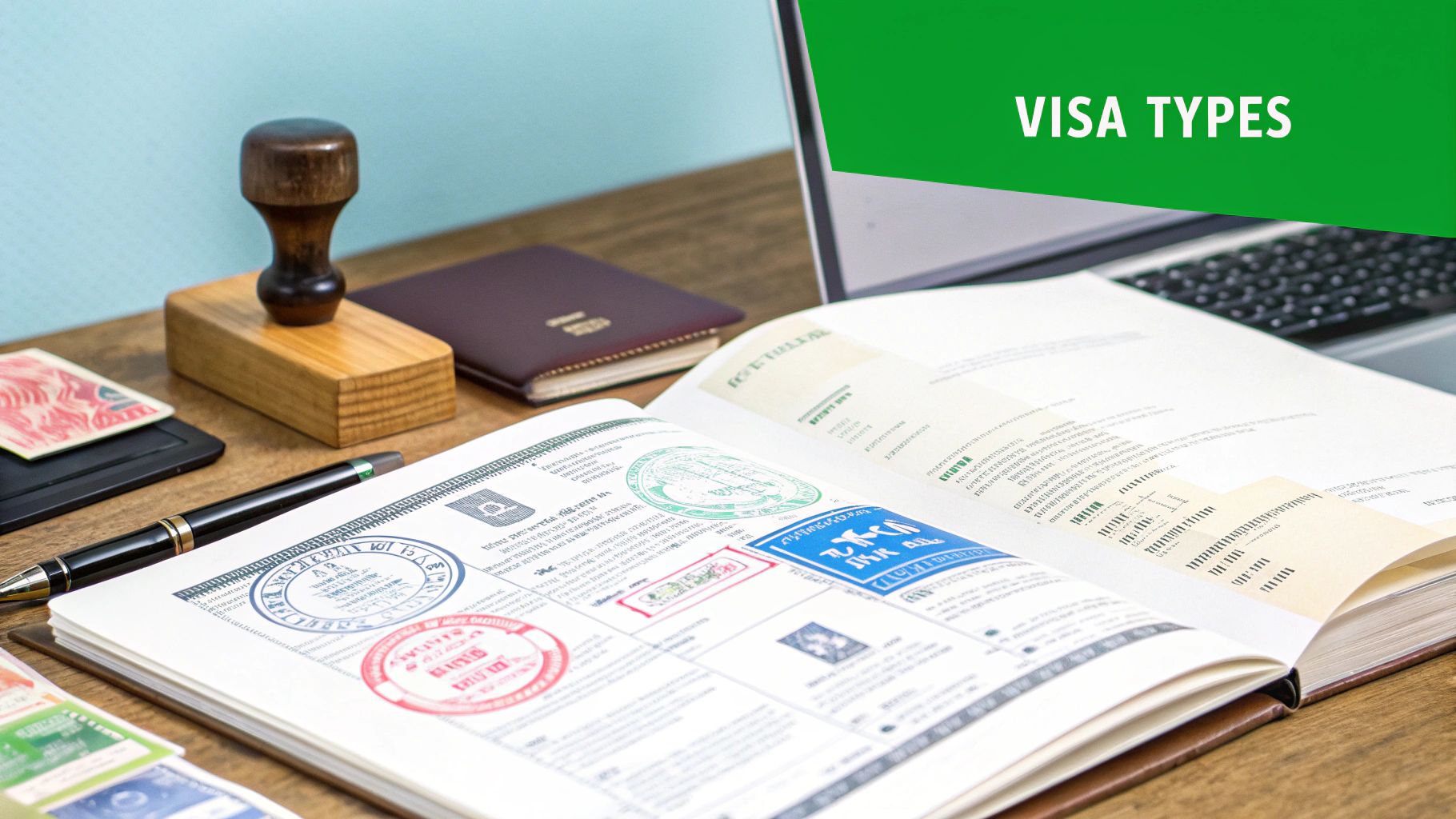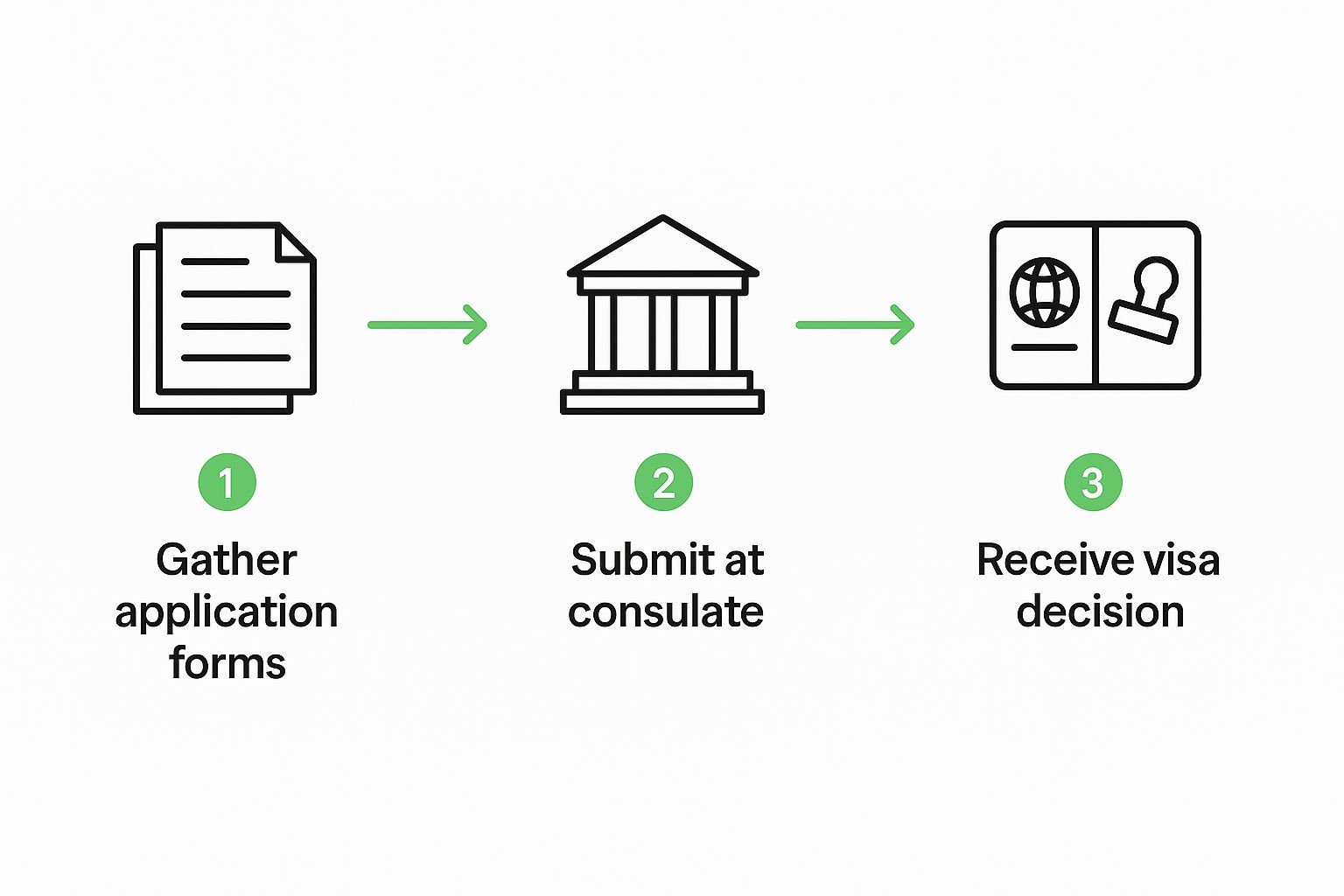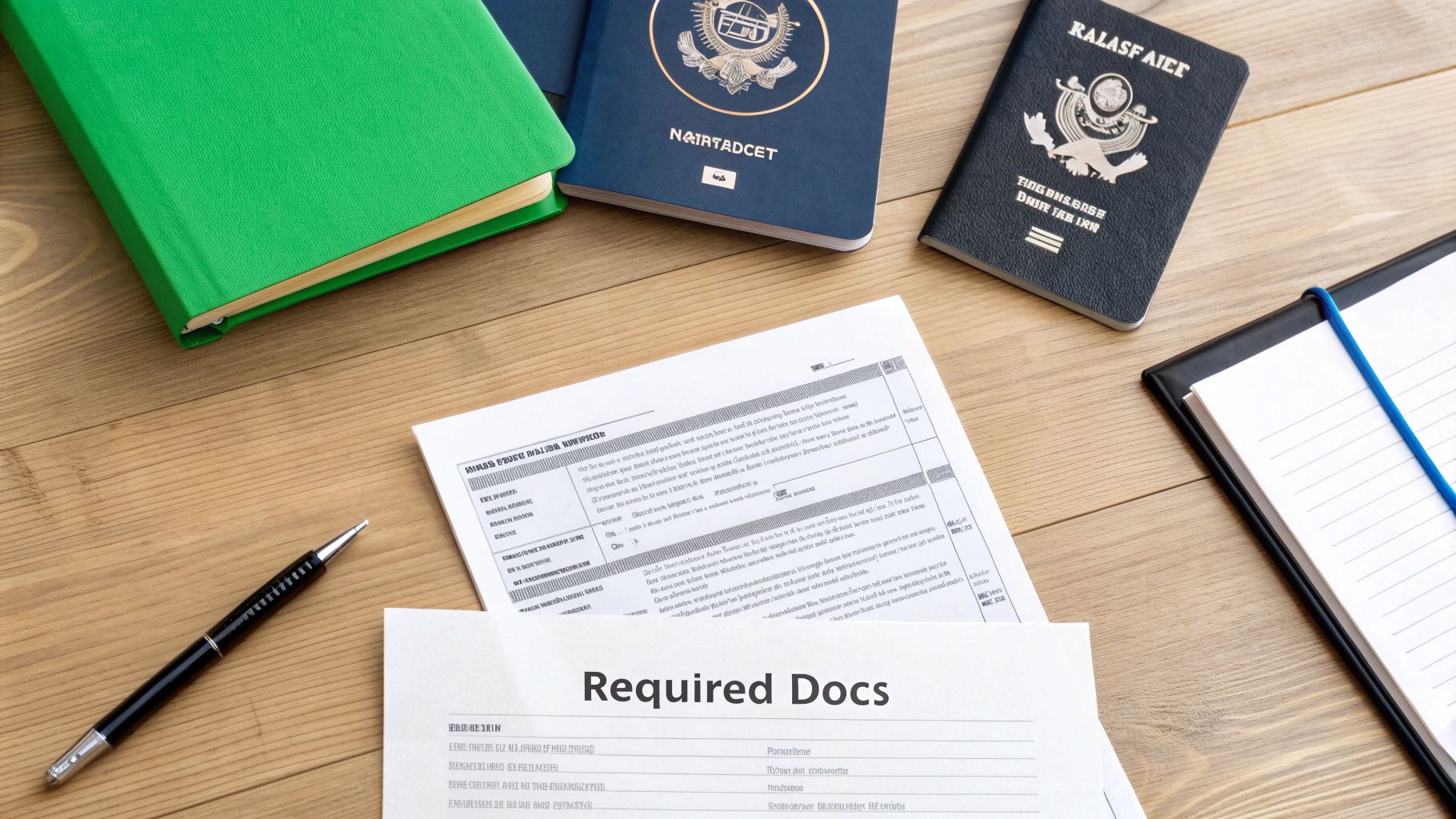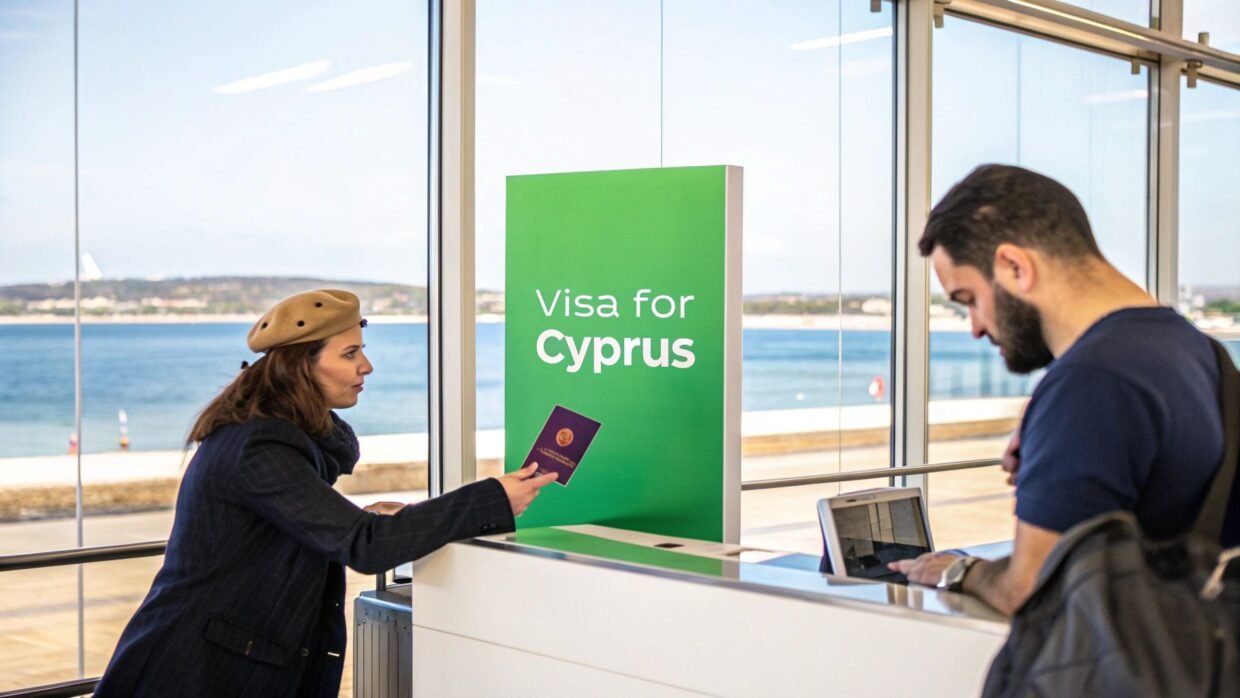Heading off to the sunny shores of Cyprus? If you're from the UK, one of the first questions you'll likely ask is, "Do I need a visa?" For most people planning a short holiday, the answer is a welcome one: no, you don't.
British passport holders, along with citizens from the EU, USA, Canada, and Australia, can pop over for tourism, business, or to visit family for up to 90 days in any 180-day period without needing a visa.
Do You Need a Visa for Cyprus from the UK?
Sorting out travel documents can feel like a chore, but when it comes to Cyprus, it's simpler than you might think. Since Brexit, the travel rules for Brits heading to the EU have shifted. However, Cyprus has its own unique flavour of entry requirements because, while it's an EU member, it hasn't yet joined the border-free Schengen Area.
This special status works in your favour. It means UK citizens can enjoy Cyprus's gorgeous beaches and ancient ruins without the hassle of a visa application for any short trip. This straightforward access covers the vast majority of holidaymakers and business travellers.
The 90/180-Day Rule Explained
The rule you need to know is the 90/180-day rule. It’s best to think of this as your personal travel allowance for Cyprus. You're allowed to spend a total of 90 days on the island within any rolling 180-day period.
This is more than enough time for a typical holiday or even a couple of shorter breaks. The key thing to remember is that this allowance is just for Cyprus. Any time you spend in other Schengen zone countries doesn't eat into your Cyprus limit, which gives you a lot more flexibility than you get with many other EU destinations.
Cyprus Visa Requirements at a Glance
To quickly see where you stand, this table breaks down the basic requirements for short stays. It's a handy reference point for different nationalities.
| Nationality | Purpose of Visit (up to 90 days) | Visa Required? |
|---|---|---|
| UK Citizen | Tourism, Business, Family Visit | No |
| EU/EEA/Swiss Citizen | Tourism, Business, Family Visit | No |
| US/Canadian/Australian | Tourism, Business, Family Visit | No |
| Other Nationalities | Tourism, Business, Family Visit | Varies (Check with your Embassy) |
This gives a clear picture for most travellers, but if your nationality isn't listed, it's always best to check with the nearest Cypriot embassy or consulate for the most accurate information.
Future Changes: The Schengen Accession
There's a big change on the horizon that's worth keeping an eye on: Cyprus is working towards joining the Schengen Area. The government is actively ticking off the technical boxes to become part of this massive passport-free zone.
Once Cyprus joins, its border rules will align with the rest of Schengen, which will almost certainly change the travel process for UK visitors. You can find more details about Cyprus's move toward the Schengen zone and what that means for international travel.
So, while planning your trip is simple for now, staying aware of these developments is smart. It will ensure any future visits to this beautiful Mediterranean island go just as smoothly.
Finding the Right Cyprus Visa for Your Stay

Not every trip to Cyprus is just a quick holiday. If you're dreaming of staying longer to work, study, or even start a new chapter of your life, you'll need to look beyond the usual tourist entry rules. The first, and most important, step is figuring out the different visa types.
Think of each visa category as a specific key, cut to unlock a particular kind of life on the island. While visa-free travel gets you through the door for a short visit, anything beyond 90 days requires official permission. Getting this right from the outset is everything, as choosing the wrong visa is a classic, and entirely avoidable, reason for rejection.
Short-Stay vs Long-Stay Visas
The first thing to get your head around is the difference between a Short-Stay Visa (Category C) and a Long-Stay Visa (Category D). It’s a fundamental split in the system.
-
Short-Stay Visa (Category C): This is your standard visa for tourism, business trips, or visiting family for up to 90 days. It's for nationalities who can't enter visa-free, and it strictly does not allow you to work.
-
Long-Stay Visa (Category D): This is the one you’ll need if you plan to be in Cyprus for more than 90 days. It isn't a single permit but rather the starting point for various long-term stays, whether it's for a job, your studies, or to join family.
Essentially, a Category D visa is your entry ticket. You arrive in Cyprus with this visa in your passport, and then you begin the formal process of applying for a temporary residence permit with the Civil Registry and Migration Department.
Matching Your Plans to the Right Permit
Your reason for moving to Cyprus is what truly dictates the specific permit you need. Each one comes with its own checklist of requirements, eligibility rules, and paperwork. It’s not enough to simply want to stay longer; you must have a concrete, legally recognised purpose.
Choosing the correct visa is like setting the right destination on a GPS. If you select the wrong one, you’ll follow all the steps perfectly but still end up in the wrong place. The Cypriot immigration system requires a clear and documented purpose for any long-term stay.
Let's break down the main pathways for a long-term stay.
Work Visas and Permits
This is probably the most common route for non-EU nationals. A work permit is always tied to a specific job offer from an employer in Cyprus. The company usually has to demonstrate that they couldn't find a suitable candidate from within Cyprus or the EU, making your skills genuinely needed.
Student Visas
If you've secured a place at a recognised university or college in Cyprus, the student visa is your route. You'll need to show your official acceptance letter, proof that you have enough money to pay for your course and cover your living costs, and have valid health insurance.
Family Reunification Visas
This category is designed for non-EU nationals who want to join a family member already living legally in Cyprus. It typically covers spouses, children under 18, and dependent parents of either a Cypriot citizen or another non-EU national who holds a valid residence permit.
It's also worth remembering that the island has a unique political and geographical landscape. Understanding this can be helpful when navigating administrative processes. To get a better feel for this, have a read of our guide explaining where Cyprus is located, as it provides context that can be surprisingly useful when dealing with officialdom.
How to Apply for a Cyprus Visa: A Step-by-Step Guide
The thought of applying for a visa can feel a bit overwhelming, but it doesn't have to be. Once you break it down, the process is a series of straightforward, manageable steps. This guide is here to walk you through it from a UK applicant's point of view, cutting through the confusion and building your confidence.
Think of it less like a single, massive hurdle and more like a three-part project: preparation, submission, and waiting for the decision. By tackling one phase at a time, you can work through it methodically. Honestly, the secret is just good organisation and paying close attention to the details.
Step 1: Finding the Right Place to Apply
Your first job is to figure out exactly where to send your application. If you’re a UK resident, you’ll need to apply through one of the official Cypriot diplomatic missions in the United Kingdom. You can't just apply online from home or pop into any old government building.
For most people in the UK, the main port of call is the Cyprus High Commission in London. It is absolutely vital that you check their official website for the latest procedures. Things like appointment booking, which forms to use, and how to submit everything can change, so never rely on second-hand information. Always go straight to the source.
Step 2: Getting All Your Paperwork Together
This is where most mistakes happen, and it's easily the most important part of the whole process. Your mission here is to put together a complete file that leaves no room for doubt about who you are and why you want to visit Cyprus. A single missing document or an incorrect form can mean long delays or, worse, a flat-out rejection.
To make things a bit easier, I've put together a checklist of the standard documents you'll almost certainly need.
Essential Document Checklist for Cyprus Visa Application
Here's a handy table outlining the key documents needed for most Cyprus visa applications. Use it as a checklist to ensure you haven't missed anything crucial.
| Document Type | Key Details and Common Mistakes to Avoid |
|---|---|
| Completed Application Form | Always download the very latest version from the High Commission's website. Fill it out clearly (no scribbles!) and double-check that you've answered every single question. |
| Valid Passport | Your passport needs at least two blank pages and must be valid for at least three months after the date you plan to leave Cyprus. Don't get caught out by this! |
| Passport-Sized Photographs | Check the official guidelines for the exact size, background colour, and pose. Using old holiday snaps or photos that don't meet the specs is a common reason for rejection. |
| Proof of Travel | This means your confirmed flight itinerary showing your arrival and departure dates. Don't book non-refundable flights until you have your visa, but you do need a confirmed reservation. |
| Proof of Accommodation | You’ll need to show confirmed hotel bookings for your entire stay or provide an official letter of invitation if you're staying with friends or family in Cyprus. |
| Proof of Financial Means | Recent bank statements, usually from the last three months, are required to show you can afford your trip. They want to see you have enough funds to cover your expenses. |
| Travel Medical Insurance | Your policy must cover you for the whole time you're in Cyprus and include medical emergencies and repatriation, with minimum coverage of €30,000. |
Having all these documents in order before you even think about booking an appointment is the key to a smooth application.

As you can see, success really comes down to doing the prep work properly before you even set foot in the consulate.
Step 3: Submission and Biometrics
Once you have your complete, perfectly organised document package, it's time for the submission stage. This usually involves booking an appointment at the consulate or a visa centre they work with. Be on time, and be prepared.
At your appointment, you’ll hand over your documents and usually provide your biometric data. This is just a standard security step where they'll scan your fingerprints and take a digital photo. After everything is submitted, you’ll get a receipt. Keep this safe! You’ll need it to track your application and pick up your passport later.
For those considering a longer stay for remote work, keep in mind that the application is a bit different. You can find out more about those specific requirements in our detailed guide on the Cyprus digital nomad visa.
Securing a Work Permit to Launch Your Career in Cyprus

So, you're dreaming of combining a Mediterranean lifestyle with your professional ambitions? For many, landing a job in Cyprus is the perfect way to make that happen. But for non-EU nationals, including those from the UK since Brexit, it means navigating the work permit process. It's a structured pathway, but it all starts with one crucial element: a Cypriot employer.
Think of your future employer as your sponsor. They don't just offer you a job; they are the key that unlocks your entire application. The process for getting an employment visa is actually kicked off and managed by the company in Cyprus, not by you. This is a vital point that shapes the whole journey.
Essentially, your employer has to convince the Cypriot Civil Registry and Migration Department that your skills are genuinely needed and that no suitable candidate could be found within Cyprus or the wider EU. This is how the system ensures that foreign workers are filling real gaps in the local labour market.
Your Employer’s Critical Role
Before you can even think about your own paperwork, your employer has a fair bit of homework to do. Their first port of call is securing approval from the Cyprus Department of Labour.
This involves putting together a solid application package that includes things like:
- The employment contract, which needs an official stamp from the Department of Labour.
- Proof they tried to hire locally, showing the job was advertised and no qualified Cypriot or EU citizens came forward.
- Company registration documents and proof that they're up-to-date with their taxes.
Only when the Department of Labour gives them the green light can the company move on to applying for your entry and work permits. This whole initial stage is completely out of your hands, which makes having clear and open communication with your future boss absolutely essential.
Different Employment Permit Categories
It's also worth knowing that not all work permits are the same. Cyprus has several types of employment visas, each designed for different professional scenarios. Figuring out which one fits your situation helps you understand the specific rules and expectations.
The main categories you'll come across are:
- General Employment: This is the standard route for most foreign nationals who have a job offer from a Cypriot company.
- Intra-Company Transfers (ICT): This is for employees of an international firm who are being moved to the Cyprus branch for a specific, temporary project. It's common for managers, specialists, or graduate trainees.
- Companies of Foreign Interests: A special category for international businesses in Cyprus, making it a bit easier for them to hire non-EU nationals for key roles.
- Seasonal Work: Mainly for industries like tourism and agriculture, these permits cover temporary jobs that only last a few months.
The bigger picture of global migration can also affect things. For example, recent UK government statistics from the Office for National statistics and Home Office show a significant drop in work-related visas issued to UK residents looking to move abroad. The number of main applicants for work visas fell by 49%, a change partly linked to new UK visa rules. This has a knock-on effect on the flow of workers to places like Cyprus.
This shifting environment just underscores how competitive securing a work visa can be.
The Application Journey From Your Side
Once your employer gets all the necessary approvals in Cyprus, you'll be issued an entry permit (usually a Category D visa). You’ll use this to travel to the island. But you're not done yet! On arrival, you must register with the immigration authorities within seven days to finalise your application for a temporary residence and work permit.
This final step involves submitting your documents—like your passport, the employment contract, and medical certificates—and having your biometric data (fingerprints and photo) taken.
Once you've sorted your new job and permit, finding a place to call home is the next big adventure. For anyone planning on staying a while, getting familiar with the rental market early is a very smart move. You can get a head start by checking out our in-depth guide to finding long-term rentals in Cyprus.
Reuniting with Loved Ones Using a Family Visa

For so many people, the dream of moving to Cyprus isn’t just about the sunshine and lifestyle; it’s deeply personal. It’s about being with the people who matter most. The family reunification visa is the official pathway designed for exactly this purpose, allowing non-EU nationals to join their relatives who are already legally living on the island.
At its heart, this process is all about proving a genuine, established family link. Forget about your professional skills or tourist itineraries for a moment. Your application rests entirely on demonstrating your relationship to a sponsor in Cyprus, and their legal and financial standing is the very foundation of your case.
Who Is Eligible to Apply?
The rules for family reunification are deliberately specific, focusing on keeping immediate family members together. Think of it as a tightly defined circle of relationships that the Cypriot government formally recognises for this visa type.
Generally speaking, you might be eligible to apply if you are the:
- Spouse of a Cypriot citizen or a non-EU national who is a legal resident.
- Minor child (under the age of 18), including any adopted children, of a legal resident.
- Dependent parent or parent-in-law, where you can clearly prove you rely on your family in Cyprus for financial and personal support.
It's crucial to understand that this visa isn't a route for more distant relatives like cousins, aunts, uncles, or adult siblings. The system is built to support the core family unit, and every single application turns on providing clear, official proof of these specific relationships.
What the Sponsor in Cyprus Must Provide
Your family member already in Cyprus plays a massive part in this process. They aren't just sending an invitation; they are formally sponsoring your application and, in doing so, taking direct responsibility for you. The Cypriot authorities need solid proof that you will be properly looked after and won't need to rely on public funds.
A family visa application is a joint effort. While you provide your personal documents from abroad, your sponsor in Cyprus has to supply the evidence of stability and support. Without a strong foundation from the sponsor, an application simply won't get off the ground.
Your sponsor will almost certainly need to submit:
- Proof of Stable Income: They must show they earn enough to comfortably support the entire household, including you. This usually means providing employment contracts, bank statements, and recent tax returns.
- Adequate Accommodation: You need to prove there's a suitable place for you to live. This is typically done with a rental agreement or property title deed for a home large enough for the family.
- Valid Health Insurance: The sponsor is responsible for arranging a comprehensive health insurance policy that will cover you from the moment you arrive.
The Application Process for Family Members
Once your sponsor has their paperwork sorted, it's your turn to begin the application from your home country. The main part of your submission is proving who you are and your relationship to the sponsor. This requires official documents like marriage and birth certificates, which will likely need to be officially translated and legalised (apostilled) to be accepted.
It's also worth noting how wider policy changes can affect things. For instance, UK Home Office data shows that overall family visa applications jumped to 12,700 in April 2024 before dropping to 6,900 in May 2024 after the UK introduced stricter income rules. This shows just how sensitive migration flows are to government policy, which can have a knock-on effect on the number of people applying to join family in popular destinations like Cyprus. You can delve into these figures and see the trends for yourself in the latest UK government statistics.
Avoiding Common Pitfalls in Your Cyprus Visa Application
Getting your visa application right often comes down to sidestepping the common mistakes that catch others out. It's not just about gathering the right documents; it's about understanding the process from the consulate's perspective. Nailing the details on costs, timelines, and potential red flags is what separates a successful application from a stressful one.
First, let's talk about the cost. The standard fee for a Short-Stay Cyprus visa is €80. It's always a good idea to double-check this on the High Commission's official website right before you apply, as these things can change. Remember, this fee is for processing your application and is non-refundable, whether you get the visa or not.
Think of it this way: you're paying for their time to assess your file, not for the visa stamp itself. This is standard procedure for embassies around the world.
Realistic Timelines and When to Apply
When it comes to visa applications, patience isn't just a virtue; it's a necessity. The official processing time for a Cyprus visa is typically up to 15 calendar days. However, don't bank on that. In some cases, particularly if your application needs a closer look or you're applying during a busy holiday period, it can stretch to as long as 45 days.
To save yourself a world of stress, apply well ahead of your travel dates. The sweet spot is submitting everything at least one month before you plan to fly. This buffer gives you plenty of breathing room to handle any unexpected delays without panicking.
Common Rejection Reasons to Avoid
An application rejection is frustrating, especially when it's for a simple, preventable mistake. Forewarned is forearmed, so let's look at the most common reasons applications get turned down.
- Insufficient Proof of Funds: This is a big one. The consular officer needs to see clear evidence that you can comfortably afford your trip. A single, vague bank statement with a low balance just won't cut it. They are looking for a stable financial history that shows you can cover flights, hotels, and daily spending without struggling.
- Invalid Travel Insurance: Don't just buy the cheapest policy you can find. Your travel insurance must meet specific criteria: a minimum of €30,000 in coverage, valid for the entire duration of your stay, and it must explicitly cover medical emergencies and repatriation. If your policy misses any of these key points, it’s an automatic red flag.
- A Weak Purpose-of-Visit Statement: Your application needs to tell a clear, believable story. If your flight bookings don't match your hotel reservations, or your stated reason for visiting seems flimsy, it raises doubts. Make sure every piece of your application—from your itinerary to your cover letter—presents a consistent and credible picture of your travel plans.
At its core, a visa application is a trust exercise. From the consulate's point of view, they are assessing risk. Every document you submit should build a case that you are a genuine visitor who will play by the rules and return home as planned.
By carefully checking these key areas before you submit, you dramatically improve your odds of getting that visa stamped in your passport.
Frequently Asked Questions About Cyprus Visas
It's completely normal to have a few lingering questions when you're sorting out your travel documents. Think of this section as a quick chat with someone who's been through it all before, designed to clear up those final bits of confusion so you can get on with planning your trip.
Can I Renew a Visa While in Cyprus?
For most holidaymakers, the answer is no. Short-stay visas, the kind you get for tourism (Category C), are issued for a set period and can't be extended once you're on the island. The expectation is that you'll head home before it expires.
However, it's a different story if you're in Cyprus for the long haul on a work or study visa (Category D). In that case, you'll have a temporary residence permit, which you absolutely can—and must—renew before it runs out. This is all handled locally through the Civil Registry and Migration Department, not an embassy.
What Happens if My Visa Application Is Rejected?
Getting a "no" on your visa application is disheartening, but it doesn't have to be the final word. The consulate will send you an official letter explaining exactly why they refused it. Read this document carefully; it's your key to understanding what went wrong. Often, it's something fixable, like missing documents or proof of funds.
Based on the reason, you can either appeal the decision or simply correct the mistake and reapply. The most important thing is to directly address the issues they pointed out in your next application.
How Does Travel Between North and South Cyprus Work?
For most travellers, crossing the "Green Line" that separates the Republic from the north is pretty simple. As long as you've flown into a legal airport like Larnaca or Paphos in the south, you can usually pop over to the north for a day trip. Just have your passport ready to show at one of the official checkpoints.
A word of caution: Always make sure you enter and leave Cyprus through a legal port of entry in the Republic of Cyprus (the south). Flying into an airport in the north, like Ercan (ERC), is considered an illegal entry by the Republic of Cyprus. This can cause serious headaches, including being denied entry to the south or facing problems with future visa applications.
Is a Cyprus National Visa Valid for Schengen Countries?
This is a common point of confusion, but the answer is a straightforward no. While Cyprus is a proud member of the EU, it hasn't fully joined the border-free Schengen zone yet.
This means your Cyprus visa is only good for entering Cyprus. If your travel plans include hopping over to other European countries like Greece, Italy, or France, you'll need to apply for a separate Schengen visa specifically for those destinations.
At SayCyprus, our mission is to help you explore every sun-drenched corner of this incredible island. From practical visa guides to discovering the best-kept secrets, we're here to make your journey truly special. Find more insider tips and travel inspiration over at SayCyprus.com.












